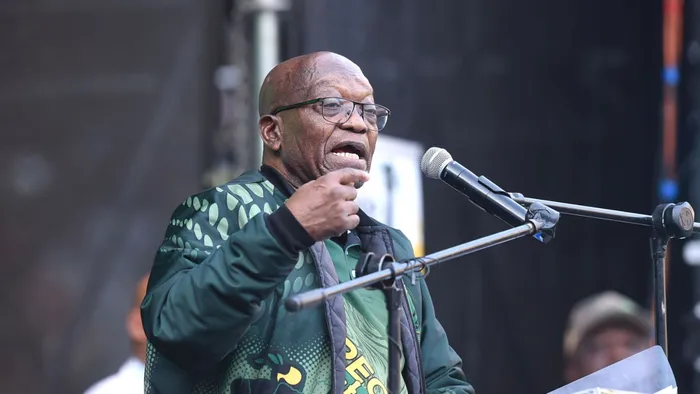‘Zuma will rule country, even from Nkandla’

Former President Jacob Zuma. Picture: Itumeleng English/ Independent Newspapers
Durban — UMkhonto weSizwe Party (MKP) supporters will have to wait until after the elections to know who will be President on behalf of Jacob Zuma if the party wins without a two-thirds majority, said a party activist.
The KwaZulu-Natal-based activist, who asked to remain anonymous because he was not authorised to speak to the media, said that according to the party’s national interim leadership structure, whoever is appointed President will take instructions from Zuma, who will remain the party head and rule the country behind the scenes from his Nkandla homestead.
Following the apex court ruling, which overturned the Electoral Court ruling that Zuma was eligible, after the Independent Electoral Commission of South Africa (IEC) had removed him as an election candidate, his supporters were left disillusioned.
The MKP activist, who is on the party’s KwaZulu-Natal election list, said party leaders were hoping to score a two-thirds majority, which will allow them to use their party’s overwhelming majority in Parliament to alter Section 47 (e) of the Constitution, which states that a person such as Zuma – who was sentenced to more than 12 months in prison without an option of a fine – is not eligible to participate in the elections before the end of five years after completing the sentence.
“Zuma can lead from Nkandla for a few months after the elections while the Parliament adopts a motion to change the Constitution.
“If we have a two-thirds majority, we adopt the motion, we change the Constitution and Zuma becomes the State President,” said the activist.
MKP spokesperson Nhlamulo Ndhlela told the media that the ruling by the country’s highest court had reinforced the party’s conviction to reinstate Zuma into the Union Buildings through the two-thirds majority.
The activist said although the party has sufficient leaders who could rule the country if the party won without a two-thirds majority, it has yet to appoint a person to replace Zuma in Parliament officially.
“That decision will be taken at an official consultation of the interim executive committee, which will meet immediately after the elections, dependent on the outcome of the elections, because it (the committee) cannot meet now as we are putting all efforts into the elections,” he said.
Party secretary-general Sihle Ngubane also told Independent Media that the party will wait for Zuma to give direction.
“We going to have a meeting as an executive, and president Zuma is going to lead us from now onwards.
“South Africans must relax as every direction president Zuma (will give) will lead us and we will follow him,” said Ngubane.
The party is also sceptical about two centres of power, whereby the president of the ruling party will not be the country’s President.
“Zuma can lead from Nkandla, but the problem is that this might lead to factionalism and infighting when the person who is representing the party in the Union Buildings turns around and refuses to take instructions from him,” said the activist.
However, political analysts Sakhile Hadebe and Mpumelelo Zikalala doubt the MKP will be able to secure half plus one of the seats in the National Assembly to govern the country, not to mention a two-thirds majority.
“I refuse to believe that MKP can get a majority vote. The ANC will get the majority vote, DA will be number two and MKP will be number three or four.
“But in KZN they will have a significant role because the ANC is likely to fall below 50%.
“It is a wild dream (for MKP to win), let alone two-thirds, and they won’t even reach the position of being the official opposition,” said Hadebe.
Zikalala said Zuma could not have control over a person who would be the country’s President on behalf of the MKP because such a person would be restrained by the Constitution.
“They can do whatever they want to do in theory, but the practicality of it might be a bit of an issue because such a person would take decisions as the President of the country and not a President who takes some instructions from a person who is not in Parliament.
“Even if he (Zuma) were to go to Parliament, he was not going to be eligible (to be the President) because you are only allowed to serve two terms as there is no cooling-off period and coming back after you have served two terms.
“His resignation did not take away that he had served the terms, as the term ends either by resigning, or if the president died, or through the next elections. He could be a member of the National Assembly, but to be the President, no,” said Zikalala.
Sunday Tribune